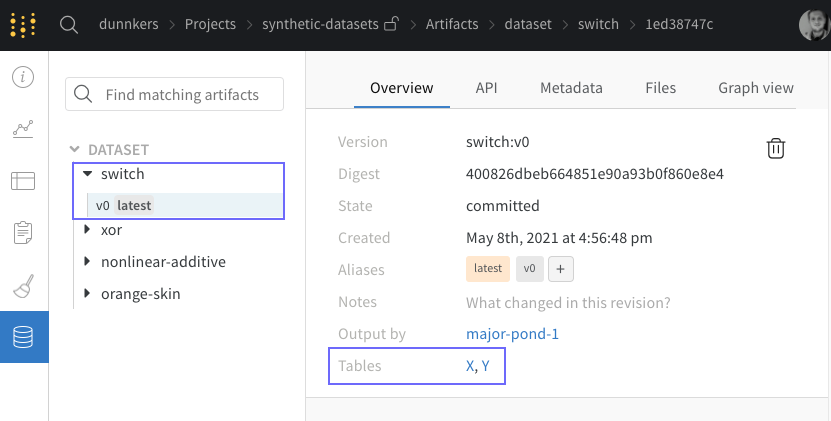DatasetConfig
class fseval.config.DatasetConfig(
name: str=MISSING,
task: Task=MISSING,
adapter: Any=MISSING,
adapter_callable: str="get_data",
feature_importances: Optional[Dict[str, float]]=None,
group: Optional[str]=None,
domain: Optional[str]=None,
)
Configures a dataset, to be used in the pipeline. Can be loaded from various sources using an 'adapter'.
Attributes:
name : str | Human-readable name of dataset. |
task : Task | Either Task.classification or Task.regression. |
adapter : Any | Dataset adapter. must be of fseval.types.AbstractAdapter type, i.e. must implement a get_data() -> (X, y) method. Can also be a callable; then the callable must return a tuple (X, y). |
adapter_callable : Any | Adapter class callable. the function to be called on the instantiated class to fetch the data (X, y). is ignored when the target itself is a function callable. |
feature_importances : Optional[Dict[str, float]] | Weightings indicating relevant features or instances. Should be a dict with each key and value like the following pattern: X[<numpy selector>] = <float> Example: X[:, 0:3] = 1.0 which sets the 0-3 features as maximally relevant and all others minimally relevant. |
group : Optional[str] | An optional group attribute, such to group datasets in the analytics stage. |
domain : Optional[str] | Dataset domain, e.g. medicine, finance, etc. |
Adapters
To load data, you require to define an adapter. Several are available.
OpenMLDataset
class fseval.config.adapters.OpenMLDataset(
dataset_id: int=MISSING,
target_column: str=MISSING,
drop_qualitative: bool=False,
)
Allows loading a dataset from OpenML.
Attributes:
| dataset_id : int | The dataset ID. |
| target_column : str | Which column to use as a target. This column will be used as y. |
| drop_qualitative : bool | Whether to drop any column that is not numeric. |
Example
So, for example, loading the Iris dataset:
- YAML
- Structured Config
name: Iris Flowers
task: classification
adapter:
_target_: fseval.adapters.openml.OpenML
dataset_id: 61
target_column: class
from hydra.core.config_store import ConfigStore
from fseval.config import DatasetConfig
from fseval.config.adapters import OpenMLDataset
from fseval.types import Task
cs = ConfigStore.instance()
cs.store(
group="dataset",
name="iris",
node=DatasetConfig(
name="Iris Flowers",
task=Task.classification,
adapter=OpenMLDataset(dataset_id=61, target_column="class"),
),
)
WandbDataset
class fseval.config.adapters.WandbDataset(
artifact_id: str=MISSING
)
Loads a dataset from the Weights and Biases artifacts store. Data must be stored in two tables X and Y.
Requires being logged into the Weights and Biases CLI (in other words, having the WANDB_API_KEY set), and having installed the wandb python package.
Attributes:
| artifact_id : str | The ID of the artifact to fetch. Has to be of the following form: <entity>/<project>/<artifact_name>:<artifact_version>. For example: dunnkers/synthetic-datasets/switch:v0 would be a valid artifact_id. |
Example
For example, we could load the following artifact:

using the following config:
- YAML
- Structured Config
name: Switch (Chen et al.)
task: regression
adapter:
_target_: fseval.adapters.wandb.Wandb
artifact_id: dunnkers/synthetic-datasets/switch:v0
feature_importances:
X[:5000, 0:4]: 1.0
X[5000:, 4:8]: 1.0
from hydra.core.config_store import ConfigStore
from fseval.config import DatasetConfig
from fseval.config.adapters import WandbDataset
from fseval.types import Task
cs = ConfigStore.instance()
cs.store(
group="dataset",
name="chen_switch",
node=DatasetConfig(
name="Switch (Chen et al.)",
task=Task.regression,
adapter=WandbDataset(artifact_id="dunnkers/synthetic-datasets/switch:v0"),
feature_importances={
"X[:5000, 0:4]": 1.0,
"X[5000:, 4:8]": 1.0
}
),
)
<> Functions
We can also use functions as adapters, as long as they return a tuple (X, y). e.g. using sklearn.datasets.make_classification as an adapter:
- YAML
- Structured Config
name: My synthetic dataset
task: classification
adapter:
_target_: sklearn.datasets.make_classification
n_samples: 10000
n_informative: 2
n_classes: 2
n_features: 20
n_redundant: 0
random_state: 0
shuffle: false
feature_importances:
X[:, 0:2]: 1.0
from fseval.config import DatasetConfig
from fseval.types import Task
synthetic_dataset = DatasetConfig(
name="My synthetic dataset",
task=Task.classification,
adapter=dict(
_target_="sklearn.datasets.make_classification",
n_samples=10000,
n_informative=2,
n_classes=2,
n_features=20,
n_redundant=0,
random_state=0,
shuffle=False,
),
feature_importances={"X[:, 0:2]": 1.0},
)
⚙️ Custom adapter
To load datasets from different sources, we can use different adapters. You can create an adapter by implementing this interface:
class AbstractAdapter(ABC, BaseEstimator):
@abstractmethod
def get_data(self) -> Tuple[List, List]:
...
For example:
@dataclass
class CustomAdapter(AbstractAdapter):
def get_data(self) -> Tuple[List, List]:
X = [[]]
Y = []
return X, Y
More examples
For more examples, see the repo for more dataset configs.